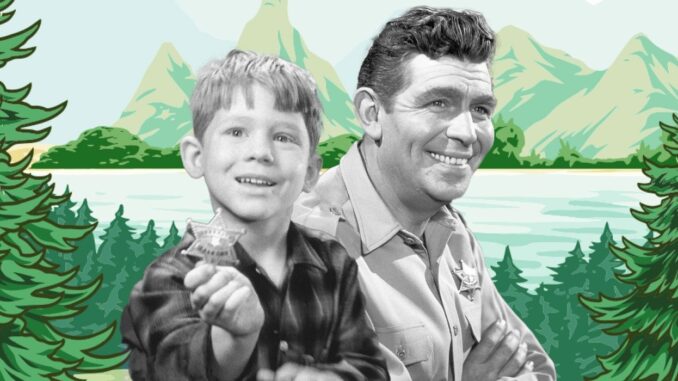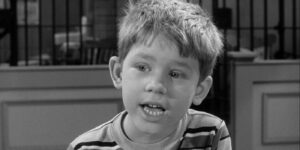
Introduction: A Show Saved by a Father’s Instinct
What if one of the most beloved characters on The Andy Griffith Show was entirely different? It’s hard to imagine Opie Taylor, played by a young Ron Howard, being anything other than the kind, thoughtful boy we grew to love. However, behind the scenes, Ron Howard’s father, Rance Howard, stepped in to demand a critical change in Opie’s characterization. This bold move not only saved Opie’s character but also preserved the heart of the series. Let’s dive into the fascinating story of how one father’s insight reshaped television history.
The Original Vision for Opie Taylor
Opie’s Early Draft: A Typical Troublemaker
Initially, the writers envisioned Opie as a mischievous and somewhat bratty child. He was meant to be a source of comedic conflict, often getting into trouble and challenging his father, Sheriff Andy Taylor. This trope was common in sitcoms of the era, but it didn’t sit well with Rance Howard.
Why the Troublemaker Trope Didn’t Fit Mayberry
Mayberry was a town built on wholesome values and heartfelt relationships. A bratty Opie would have clashed with the show’s warm and moral tone. The dynamic between Andy and Opie needed to reflect trust, love, and respect to resonate with audiences.
Rance Howard Steps In: The Critical Demand
A Father’s Insight
Rance Howard, a seasoned actor and father, recognized that the original portrayal of Opie didn’t align with the show’s potential. He approached the producers and insisted on a rewrite. His demand? Opie should be a reflection of Andy’s parenting—a respectful, curious, and kind-hearted boy.
Convincing the Producers
At first, the producers hesitated. They believed a “troublemaker” Opie would bring more laughs. But Rance argued that a respectful father-son relationship would create a deeper emotional connection with viewers. His persistence paid off.
The Transformation of Opie’s Character
A Shift to Wholesome Storytelling
The rewritten Opie was no longer a source of chaos but a beacon of innocence and learning. His interactions with Andy became a platform to explore life lessons, morality, and human connection.
Examples of Opie’s New Persona
In episodes like “Opie the Birdman”, where Opie cares for orphaned baby birds, viewers saw a compassionate and thoughtful child. This shift made Opie relatable and endearing, cementing his place as a beloved character.

The Impact on ‘The Andy Griffith Show’
A Father-Son Bond That Defined the Series
The relationship between Andy and Opie became the emotional core of the show. Their heartfelt conversations and mutual respect set The Andy Griffith Show apart from other sitcoms of its time.
Audience Reception
Viewers immediately connected with the new Opie. Ratings soared, and critics praised the show for its unique blend of humor and heart. The decision to rewrite Opie’s character proved to be a masterstroke.
Behind-the-Scenes Stories
Ron Howard’s Memories of His Father’s Influence
Ron Howard has often credited his father for shaping his career and protecting his interests. In interviews, he recalls how his dad’s insistence on this change taught him the importance of integrity in storytelling.
Andy Griffith’s Thoughts on the Change
Andy Griffith himself was reportedly relieved by the decision. He believed that a bratty Opie would have detracted from the show’s charm and made his character less relatable as a father figure.
How This Decision Shaped TV History
A Template for Future Sitcoms
The success of Opie’s characterization influenced other shows to prioritize heartfelt storytelling. The father-son dynamic became a blueprint for family-centered sitcoms.
Ron Howard’s Rise to Stardom
The change not only saved the series but also set Ron Howard on a path to becoming one of Hollywood’s most respected figures. His portrayal of Opie remains iconic to this day.
The Legacy of Rance Howard’s Intervention
A Bold Move That Paid Off
Rance Howard’s decision to challenge the producers was a risk, but it preserved the integrity of the series. It’s a testament to the power of standing up for what you believe in, even in the face of resistance.
A Timeless Father-Son Relationship
The bond between Andy and Opie continues to resonate with audiences decades later. It’s a reminder of the enduring power of love, respect, and good storytelling.
Conclusion: One Change That Changed Everything
Rance Howard’s insistence on reshaping Opie’s character wasn’t just about protecting his son—it was about preserving the heart of The Andy Griffith Show. This bold move transformed Opie into a character who symbolized innocence, growth, and love. Without this change, the series might not have become the timeless classic we cherish today.
FAQs
1. Why did the producers originally want Opie to be a troublemaker?
They believed a mischievous child would add comedic conflict and align with typical sitcom dynamics of the era.
2. How did Rance Howard convince the producers to change Opie’s character?
Rance argued that a respectful and loving father-son relationship would create a deeper emotional connection with viewers, ultimately winning them over.
3. What was Ron Howard’s reaction to his father’s intervention?
Ron Howard has expressed gratitude for his father’s influence, crediting him with shaping his career and protecting his best interests.
4. How did Andy Griffith feel about the change in Opie’s character?
Andy Griffith supported the decision, believing it enhanced the show’s charm and made his character more relatable.
5. What is the lasting legacy of this change?
The decision set a new standard for family dynamics in sitcoms, influencing future shows and solidifying The Andy Griffith Show as a timeless classic.
